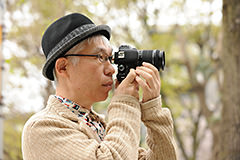Here is a review of the EOS 100D together with some actual examples by a professional user of the EOS 5D Mark III and EOS M to give a complete picture of this ambitious model. The EOS 100D is the world's smallest and lightest digital SLR camera that is equipped with an APS-C sized sensor*. (Reported by: Satoru Watanabe)
* As of March 1, 2013, Canon

Genuine DSLR with Amazingly Compact Size is Close to Perfection

EF40mm f/2.8 STM/ Program AE (1/80 sec., f/2.8, -1.3EV)/ ISO 1600/ WB: Auto
A shot of some small, mysterious items displayed on the shelf of a shop that I frequent. I sometimes take shots of objects resting on the racks at home too, as they tell us much about their era.
Optical viewfinder built into compact body enabling fast AF with superb battery capacity
It has been a long time since I was so amazed by a new product. The EOS 100D is so amazingly small, it literally fits into the palm. Not only so, the EOS 100D is also light! The saying that "the best digital camera is the latest three-digit EOS model" still holds true.
Although the mirrorless model also possesses the qualities of lightweight and compactness, the EOS 100D is a full-fledged SLR camera. Some merits of mirrored cameras include the AF speed. Even with the enhanced performance of contrast AF today, phase-difference AF still boasts a slight advantage. The crisp operation of the AF makes it very pleasant for use. Viewfinder clarity is also excellent, offering users an enjoyable viewing experience not obtainable with the rear LCD monitor or EVF (Electronic Viewfinder).

EOS 100D is a genuine DSLR that comes in amazingly small size. Phase-difference AF can be used during optical viewfinder shooting, which enables quick AF.
One of the greatest discontents I have about mirrorless cameras is the battery life. As power is consumed by the LCD monitor constantly, I needed to exercise caution to prevent the battery from running out during a shoot. In particular, the battery may run out faster under low temperature, such as during winter, and this may stop me from taking shots as and when I like. Meanwhile, I believe that the greatest merit of a DSLR camera lies in the battery. During this trial, I used the EOS 100D for three days, and captured up to 8GB of image data. Despite the fact that the shoot took place in the cold late autumn, and I recorded close to 3GB of data a day, the battery level did not drop at all.

Despite the size paring with a mirrorless camera, one of the EOS 100D's biggest strength is its battery life. You can bring the camera where ever you want and shoot photos whenever you want.
Yet another noteworthy quality is the accuracy of the AWB (Auto white balance) feature, which is capable of reproducing the colors of the subject accurately regardless of the shooting condition. What matters most is the ability to reproduce gray, which is the base color. While this can be a challenging task, the Auto setting does everything for the user, so very little touch-up is needed after taking a shot. One of my favorite lenses is the EF40mm f/2.8 STM, which matches well with the EOS 100D both in size and balance. This combination is the perfect choice for travel, as it allows you to enjoy both impeccable image quality and portability.

Accuracy of the white balance feature has also improved. The Auto setting is capable of reproducing colors as we see with our naked eyes regardless of the shooting condition. You can change setting easily using the touch screen feature.
Satoru Watanabe's evaluation of the EOS 100D as a "Snap Camera"

Point 2: How compact and light the camera is
Point 3: How clear the viewfinder image is
I like the feel of shutter button, which pushes back slightly when I pressed it down, a characteristic that is only found on SLR cameras. Also, the size is amazingly compact as an SLR camera built in with a mirror mechanism, allowing me to store it into a small bag. After getting used to the EOS 100D, I'm afraid that I might find other cameras to bulky to carry around. Some may think this is a little outdated, but I prefer to capture photos through the viewfinder. This camera is almost close to perfection.

EF-S18-55mm f/3.5-5.6 IS STM/ FL: 21mm/ Program AE (1/25 sec., f/3.5)/ ISO 1600/ WB: Auto
The surroundings were so dark I could only identify the outline of the objects, a typical situation where I would not have wanted to release the shutter. However, with the advent of new models, I make it a point to explore their limits by deliberately photographing night views under adverse lighting conditions.

EF-S18-55mm f/3.5-5.6 IS STM/ FL:18mm/ Program AE (1/15 sec., f/3.5)/ ISO 1600/ WB: Auto
Redevelopment works have transformed the place where I used to live for more than 30 years into one that I could no longer recognize. Taking shots of the place reminded me of what I used to love about it.

EF40mm f/2.8 STM/ Program AE (1/80 sec., f/2.8)/ ISO 1600/ WB: Auto
Breakthroughs in the camera design widen the scope of photography. It is important to understand the performance of your camera gear in order to express your photographic intentions. With a new camera or accessory, you might just be able to capture scenes you could not in the past.

Born in 1961 in Yamagata Prefecture. After graduating from the Nihon University College of Art, Watanabe joined Nikkan Sports News, where he accumulated experience in sports and news photography. He then left the newspaper agency to become a freelance photographer. In 2003, Watanabe started a photography workshop. Now, he is also active overseas, releasing his works mainly at Gallery TOSEI in Tokyo and Tepper Takayama Fine Arts in Boston.


































